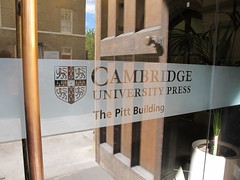 Today I’m at the University of Cambridge to officially open the Dell | Cambridge High Performance Computing (HPC) Solution Centre. This significant new collaboration aims to form EMEA’s leading HPC centre of excellence for all areas of the HPC community, whether academic or commercial. The Centre will combine large-scale, commodity-based HPC infrastructure with experienced and specialised research know-how, to overcome the traditional barriers of entry to HPC, providing academic and private sector research organisations with cost-effective, readily accessible HPC solutions designed to meet “real life” HPC challenges. Teams from Dell, The University of Cambridge and a network of third-party HPC technology vendors will build and test research-specific HPC solutions, contributing operational excellence and best in class HPC technical blueprints back to the HPC community through a series of freely available whitepapers, technical bulletins and targeted outreach activities.
Today I’m at the University of Cambridge to officially open the Dell | Cambridge High Performance Computing (HPC) Solution Centre. This significant new collaboration aims to form EMEA’s leading HPC centre of excellence for all areas of the HPC community, whether academic or commercial. The Centre will combine large-scale, commodity-based HPC infrastructure with experienced and specialised research know-how, to overcome the traditional barriers of entry to HPC, providing academic and private sector research organisations with cost-effective, readily accessible HPC solutions designed to meet “real life” HPC challenges. Teams from Dell, The University of Cambridge and a network of third-party HPC technology vendors will build and test research-specific HPC solutions, contributing operational excellence and best in class HPC technical blueprints back to the HPC community through a series of freely available whitepapers, technical bulletins and targeted outreach activities.
This is an exciting day for Dell as the Solution Centre marks a significant new collaboration aiming to accelerate discovery, and provides HPC solution blueprints and firsthand operational HPC experience targeted at solving “real world” challenges. Dr. Paul Calleja, Director HPC Service, University of Cambridge, and I, will welcome a number of researchers from across the HPC community, including press and analysts to today’s opening.
The University of Cambridge is a world-leading teaching and research institution, consistently ranked within the top three Universities worldwide The University also forms the central hub of Europe’s largest technology centre with over 1,200 technology companies located in science parks surrounding the city and boasting Europe’s largest bio-technology centre.
 As a long-term Dell customer, the University has built a reputation for excellence and understanding in developing real-world, production-ready HPC solutions that can be used within a wide-range of private and public sector research environments, with a significant emphasis on commodity clustered HPC solutions. The Solution Centre will be based out of the existing Cambridge HPC Service building, a facility already being used for delivering HPC services via a cloud computing model. On the University campus, the HPC cluster supports around 400 internal users spread across 70 research groups ranging from traditional hard sciences such as chemistry, physics and biology, through to areas rapidly growing in popularity for HPC-based research such as bio-medicine, clinical-medicine and social sciences.
As a long-term Dell customer, the University has built a reputation for excellence and understanding in developing real-world, production-ready HPC solutions that can be used within a wide-range of private and public sector research environments, with a significant emphasis on commodity clustered HPC solutions. The Solution Centre will be based out of the existing Cambridge HPC Service building, a facility already being used for delivering HPC services via a cloud computing model. On the University campus, the HPC cluster supports around 400 internal users spread across 70 research groups ranging from traditional hard sciences such as chemistry, physics and biology, through to areas rapidly growing in popularity for HPC-based research such as bio-medicine, clinical-medicine and social sciences.
Stay tuned for more information about the HPC Solution Centre as we are filming some vlogs from the opening event that will be available in the coming few days.